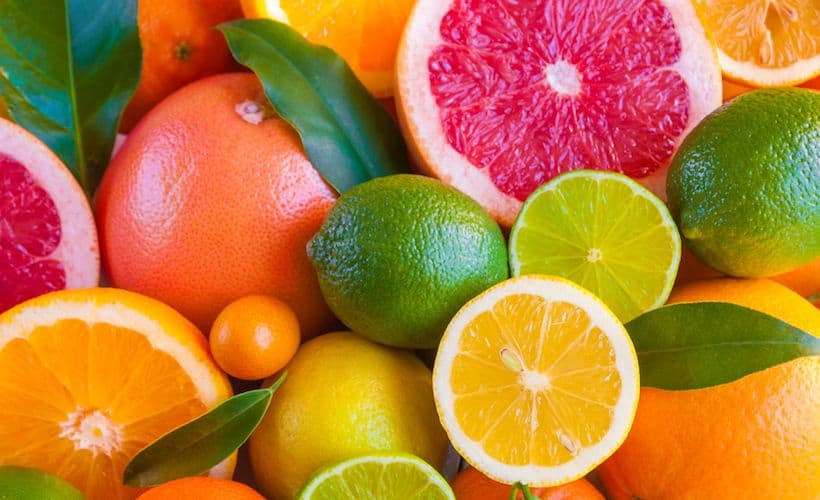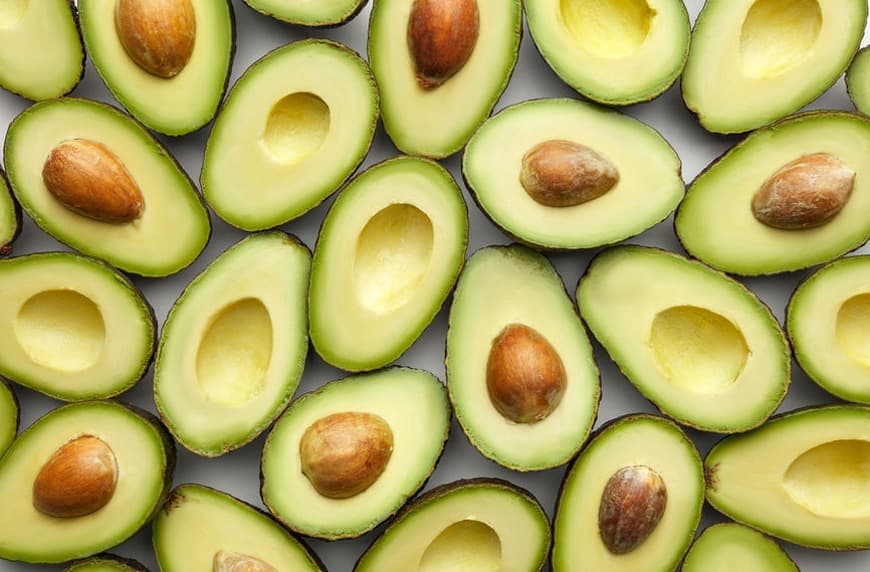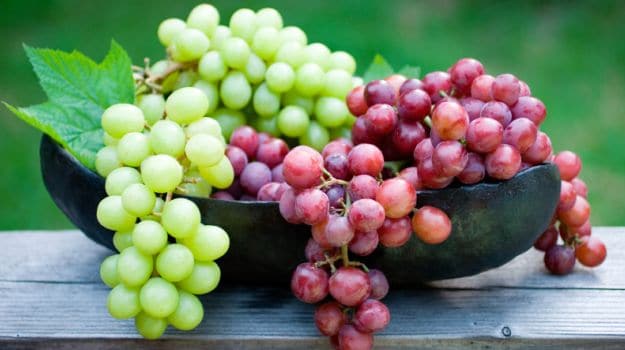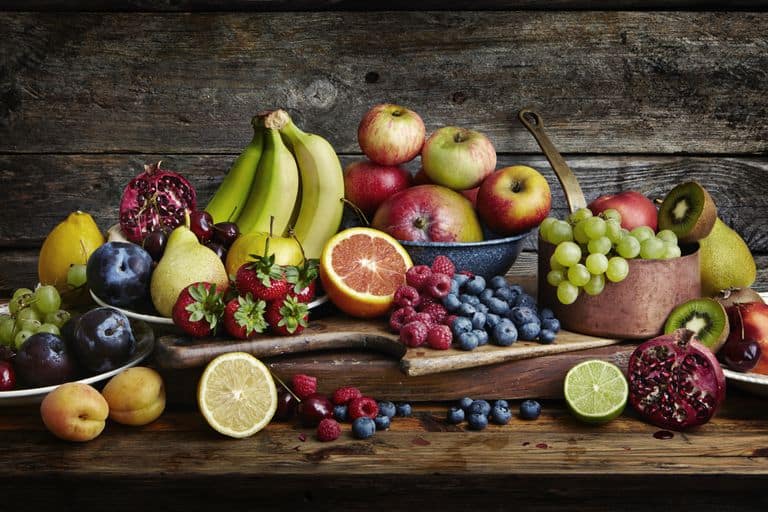The fruit is well recognized as a good source of vitamins and minerals and also sources of many nutrients like potassium, fiber, vitamin C and folate. The nutrients in fruit are vital for the health and maintenance of your body. Do you know that one of the important minerals ie potassium in fruit can reduce your risk of heart diseases? Even do you know that the folate (folic acid) in fruits helps the body form red blood cells and helps prevent neural tube birth defects, such as spina bifida? Fresh fruits are naturally sweet in taste and are super packed with nutritional benefits as well. Fruits act as cleansers for your body, give you instant energy and supply a vast array of vitamins, minerals, and antioxidants.

Benefits of Fruits:
- Fruits help to improve the functioning of the digestive tract thereby helps in preventing constipation etc
- Fruits are an important part of a healthy diet as they give ample energy without adding any extra calories.
- Fruits contain a low amount of sodium and harmful fats.
- Vitamin C, a powerful antioxidant, is found in citrus fruits mainly which helps for the common cold, wound healing, healthy skin, teeth, gums
- Dry fruits are excellent laxatives in nature and also are a great natural remedy for, fever, anaemic conditions, acidosis, etc

Rank list for fruits according to nutrient density:
In a 2014 study ranked “powerhouse” fruit by its high nutrient density and low calories. Lemons topped the list followed by strawberry, orange, lime, pink and red grapefruit.
17 Delicious Fruits With Health Benefits
1. Strawberry

- Strawberries are a juicy fruit with high water content
- They are rich sources of Beta carotene, B complex vitamins, Vitamin C
- Strawberries also contain many of the essential amino acids
- The seeds provide plenty of dietary fiber.
- Strawberries contain anthocyanins, flavonoids that can help boost heart health.
Other benefits are as follows:
- Younger looking skin-
- Improves eyesight
- Improves immunity
- Prevents cancer
- Heart Friendly
2. Blueberries

- Blueberries are superfruit that can provide lots of health benefits.
- They are good sources of fiber, vitamin C, vitamin K, and manganese
- They are excellent sources of antioxidants as well. In fact, they are believed to contain the highest antioxidant content.
- The antioxidants reduce the risk of chronic conditions, such as heart disease, diabetes, etc
- In a study, it is found that consumption of blueberries regularly may increase natural killer cells in the body which helps to defend you against oxidative stress.
- Like strawberries, blueberries contain anthocyanin which might protect against heart disease, stroke, cancers, etc
- Overall Blueberries are rich in important nutrients.
- Blueberries are rich in antioxidants and also they possess immune-enhancing properties, which may protect the body from illness.
3. Pomegranate

- Pomegranates are among the healthiest fruits one eats which are nutrient-dense.
- They are rich in some magical plant compounds that are responsible for most of their health benefits.
- It is said that the antioxidant levels in pomegranate have been shown to be three times higher than those of green tea and red wine
- Studies have shown that pomegranates have anti-inflammatory effects which help to reduce the risk of cancer
4. Watermelon — another superfruit

- Let’s share with you an interesting fact that watermelon has more lycopene than any other fresh fruit or vegetable?
- Lycopene is an antioxidant that is linked to a decreased risk of cancer, heart diseases, etc.
Some nutritional facts on watermelon:
- It contains Less amount of carbohydrates
- Vitamin A. Vitamin A is important for skin and eye health.
- Vitamin C. Vitamin C helps strengthen the immune system and aids in the absorption of iron.
- Potassium. Potassium is helpful in lowering your blood pressure.
- Vitamin B6. Vitamin B6 is important for the immune system and nerve function.
- Contains zero fat, cholesterol or sodium
5. Citrus fruits:

- They are rich in antioxidants that can combat illnesses such as heart disease and cancer.
- The most common citrus fruits such as lemons, oranges, limes, and grapefruits contain vitamins such as A (beta-carotene), vitamin C and minerals like potassium and calcium, as well as providing dietary fibre.
- Vitamins A and C are the main antioxidant vitamins that combat the harmful effects of free radicals that can cause cellular damage that is believed to be a precursor to various fatal diseases.
- Lemons contain a good amount of vitamin C,
- limes contain vitamin C and traces of vitamin A and calcium
- and oranges contain vitamins A and C and mineral-like potassium, which is an important nutrient for a healthy heart.
6. Avocado

- Most fruits are high in carbs but avocado is low in carbs and comprised of healthy fats.
- Avocados are rich in oleic acid, a type of monounsaturated fat that helps to lower cholesterol levels and protects the heart.
- The American Heart Association states that maintaining healthy cholesterol levels is very important and healthful fats could reduce the risk of heart diseases.
- Avocados are rich in potassium too.
- Adequate potassium intake is associated with reduced blood pressure and a lower risk of stroke
- They also contain lutein antioxidant which is important for healthy eyes and skin.
- People can incorporate avocado to salads, or mix with lime, garlic, and tomatoes to make guacamole.
7. Bananas

- they are KNOWN for their high potassium content.
- A medium-sized banana contains 422 mg of the adequate adult intake of 4,500 mg of potassium.
- Which helps the body control heart rate and blood pressure.
- Bananas are also a good source of energy.
8. Apples

- They contain a high amount of fibre, vitamin C, potassium and vitamin K. and loaded with B vitamins too.
- Studies suggest that the antioxidants in apples can promote heart health and reduce the risk of type 2 diabetes, cancer, etc
- There is another noticeable benefit of apples is their pectin content.
- Pectin is a prebiotic fibre that feeds the good bacteria in your gut which improve digestion and metabolic health
- Apples contain good levels of quercetin, a flavonoid that may have anti-cancer properties.
- One study found that people who consume whole apples were 30 per cent less likely to be obese than those who did not.
9. Grapefruits

- It is known for its ability to aid weight loss and reduce insulin resistance.
- Grapefruit is one of the healthiest citrus fruits.
- The flavonoids in grapefruits can help protect against some cancers, inflammation, and obesity.
- Eating grapefruit has been shown to reduce cholesterol levels and also help prevent kidney stones
- In a review study, it is suggested that the compounds called furanocoumarins found in grapefruits can help protect against oxidative stress and tumours.
- It is said in a study, furanocoumarins may have anticancer properties
- Researchers still need to carry out more studies on animals and humans to confirm these properties. It is advisable to see a doctor before adding grapefruit to their diet, as it can interact with certain medications.
10. Blackberries

- They have a high fibre content. Which can help improve gut health and heart health
- People can eat blackberries in the fresh form and even add them to yoghurt for breakfast.
11. Oranges

- Oranges are among the richest sources of vitamin C.
- As for the information, you must know that one medium fruit providing 117 per cent of a person’s daily requirement of vitamin C.
- Even it contains other nutrients as well,
- carbohydrate
- fiber
- calcium
- magnesium
- potassium
- vitamin C
- Vitamin C acts as a powerful antioxidant in the body which is good for the immune system function.
- It helps the body to absorb iron from plant-based foods.
- The human body cannot manufacture vitamin C itself, so people need to get this vitamin from their diet.
- Oranges also contain high levels of pectin, which is a fiber that can keep the colon healthy by binding to chemicals that can cause cancer.
- Oranges also provide the following healthful vitamins:
- Vitamin A that is important for healthy skin and eyesight
- B-vitamins, including thiamin and folate, which help keep the nervous and reproductive systems healthy.
12. Papaya

- Papaya is another magical fruit that is high in vitamin C, vitamin A, potassium and folate.
- It is also rich in the anti-cancer antioxidant lycopene.
- There is also some evidence that papaya contains papain, an enzyme that makes protein easier to digest
13. Guava

- If you eat just one ounce (28 grams) of guava it will give you around 107% of the RDI for vitamin C
- Guava is also rich in nutrients like fiber, folate, vitamin A, potassium, copper and manganese
- The antioxidants in guava have been shown to protect cells from oxidative damage.
- Guava is a great source of pectin too, which benefits digestion.
14. Pineapple

- Pineapple is a nutrition superstar. Pineapple is rich in vitamin C and manganese
- Pineapple also contains bromelain which known for its anti-inflammatory properties and ability to digest protein
- Test-tube and animal studies suggest that bromelain protect against cancer and tumour growth
- One cup (237 ml) of pineapple provides 131% of the Reference Daily Intake (RDI) for vitamin C and 76% of the RDI for manganese
- Pineapple is rich in vitamin C and manganese.
- Its bromelain content may fight inflammation and reduce the risk of cancer.
15. Mango

- Mangoes are an excellent source of vitamin C.,
- It also contains good amounts of soluble fiber, which can provide many health benefits.
- Mangoes have strong antioxidant and anti-inflammatory properties that may help reduce the risk of disease.
16. Cranberries

- Cranberries have an excellent nutrition profile, being rich in vitamin C, manganese, vitamin E, vitamin K1, and copper
- They also contain a significant amount of antioxidants called flavanol polyphenols, which can improve the overall health
- What makes cranberries unique from other fruits is that A-Type proanthocyanidins are the compounds that they can prevent bacteria from attaching to the lining of the bladder and urinary tract
- In this way, it prevents urinary tract infections.
17. Grapes

- Grapes are very healthy. Their high antioxidant content is what makes them stand out.
- The anthocyanins and resveratrol in grapes have both been shown to reduce inflammation
- A fruit containing eating pattern is part of an overall healthy diet and may protect against certain cancers.
- Fruit helps maintain optimum health due to the health-promoting phytochemicals it contains – many of which are still being identified.
- One to 2-1/2 cups of fruit is recommended each day, depending on how many calories you need.
Fruit vs Fruit Juice
Did you ever wonder which form of fruit gives you more nutrition – whole fruits or fruit juices?
It is sometimes difficult to say which one gives more nutrition. Although eating whole fruit is considered to be the best way, fruit juices are also easy and healthy options. Of course, if the fruit juice is made up of 100% fruit without extra preservatives, then it has the same nutritional value and also depends on straining. Fruit juices are available in two forms,
- 100% of fruits juices
- As fruit pulp + water + sugar.
- In both cases, preservatives and additives are added to increase the shelf life of the juice. Very few juices contain no preservatives. Homemade fruit juice contains the same fibre content as whole fruits, provided you don’t add artificial flavours. But if you have bought from any outside stores, these juices may not have equal fibre content after the processing. So one has to be careful.

Servings
- The United States Department of Agriculture guidelines suggested the average adult consume two servings of fruit/day
- the American Heart Association recommends adults to eat 4 to 5 serve of fruit/day.

Timings:
- For a diabetic, carbohydrate-containing foods can do spikes in blood sugar levels. Over time, repeated spikes can lead to health complications.
- The best time to eat fruits is first thing in the morning after a glass of water.
- Eating fruits right after a meal is not a great idea, as it may not be digested properly. Always ensure to give an hour gap at least between meal and fruits.
- it is always preferable to have fruits 30 to 45mins before any workout.
- it is also advisable to have fruits within 30mins of workout for glycogen replenishment.








